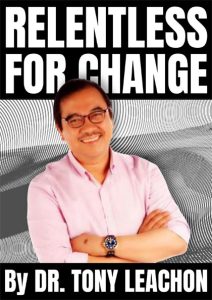
Philippines : How to live longer and happier lives?
 Target goal of Filipinos is raise life span from 71 to 80 years
Target goal of Filipinos is raise life span from 71 to 80 years
MANAGEMENT guru Peter Drucker is often quoted as saying, “You can’t manage what you can’t measure.”
Drucker means that you can’t know whether or not you are successful unless success is defined and tracked.
Unless you measure something, you don’t know if it is getting better or worse. You cannot see positive progress unless you measure to see what is improving and what is not. Quantifying your business allows you to see patterns, set targets, and measure progress.
The only way to know if we are successful in our healthcare target is to motivate our people on how to live longer. It’s something measurable and people can easily embrace it and achieve it especially if given a “to do “list or a preventive health checklist.
It is important to measure and manage people performance since it gives leaders the ability to properly gauge efficiency. Furthermore, it helps in identifying productive individuals and determining how best to improve the overall productivity of the Filipino citizens.
The average life expectancy of Filipinos is 71, which is two years the global average of 73, according to a study by the World Bank for 2020. The same study also showed that the average life expectancy of Filipino males is 67 and females 76. If you do not measure up to a standard or to someone’s expectations, you are not good enough to achieve the standard or fulfill the person’s expectations.
The highest life expectancy was in Hong Kong and Japan at 85 and the lowest was in the Central African Republic at 54. When seniors set goals, they inspire themselves to accomplish new things.
This keeps life fresh and exciting.
Living a life of intention or having a purpose in life, especially as you age, is integral to healthy living and longevity. Many studies have shown that aging with purpose can provide protection against Alzheimer’s disease, disabilities, cardiovascular problems, and impairment, and lead to longer, happier lives.
Why do we need to measure things in life ?
In a world in which no measurement tools exist, there could be no modern medicine, healthcare, surgery, pharmacology, radiology, dentistry, optometry, or audiology. And in a measureless world, there could be no science. And science is essential to improving our healthcare system.
There are things which can’t measure in our lives but I know that if we can improve our lifestyle and prolong our lives then we can live a longer, happier and more productive lives.
Love, happiness, time, memories, and personal growth are just a few examples of these intangible but invaluable aspects of our lives.
One important internal factor to consider when measuring success is happiness and fulfillment. These two factors include pursuing your passion, having positive relationships, and having a sense of purpose. They’re considered internal factors because your happiness is up to you—it comes from inside.
What major diseases kill most people globally and locally ? Here are the World Health Organization Data
Noncommunicable diseases (NCDs) kill 41 million people each year, equivalent to 74% of all deaths globally.
Each year, 17 million people die from a NCD before age 70; 86% of these premature deaths occur in low- and middle-income countries.
Of all NCD deaths, 77% are in low- and middle-income countries.
Cardiovascular diseases account for most NCD deaths, or 17.9 million people annually, followed by cancers (9.3 million), chronic respiratory diseases (4.1 million), and diabetes (2.0 million including kidney disease deaths caused by diabetes).
These four groups of diseases account for over 80% of all premature NCD deaths.
Tobacco use, physical inactivity, the harmful use of alcohol and unhealthy diets all increase the risk of dying from an NCD.
Detection, screening and treatment of NCDs, as well as palliative care, are key components of the response to NCDs.
Noncommunicable diseases account for 756 Billion burden to our economy ( 4.8 % GDP ). We need to focus on this matter. and we have a national blueprint which we will unveil soon with DOH Sec. Ted Herbosa.
Aside from the usual health goals that we need to enhance like stopping smoking , alcohol drinking , encouraging healthy eating habits , improving physical and mental energy and curbing obesity – an improved transport system is key to perk up economy and reduce noncommunicable diseases.
Physical energy is important in our health goals because it enhances intellectual energy or mental energy , emotional energy through social connections and eventually leads to spiritual energy ( inner peace , wisdom, and happiness ).
Physical inactivity leads to overweight obesity – now at 27 million – 6/10 killer diseases in the Philippines are NCDs. This will need a summit so thought leaders can discuss the problems confronting us.
If we have a healthy workforce then we can havea healthy workplace.
Nation‘s health is nation’s wealth. It’s time to dissect healthcare problems and execute a holistic plan. We can do it. We just need to focus.
When scientists began tracking the health of 268 Harvard sophomores in 1938 during the Great Depression, they hoped the longitudinal study would reveal clues to leading healthy and happy lives.
They got more than they wanted.
After following the surviving Crimson men for nearly 80 years as part of the Harvard Study of Adult Development one of the world’s longest studies of adult life, researchers have collected a cornucopia of data on their physical and mental health.
Of the original Harvard cohort recruited as part of the Grant Study, only 19 are still alive, all in their mid-90s. Among the original recruits were eventual President John F. Kennedy and longtime Washington Post editor Ben Bradlee. (Women weren’t in the original study because the College was still all male.)
Over the years, Harvard researchers have studied the participants’ health trajectories and their broader lives, including their triumphs and failures in careers and marriage, and the finding have produced startling lessons, and not only for the researchers.
“The surprising finding is that our relationships and how happy we are in our relationships has a powerful influence on our health,” said Professor Robert Waldinger , director of the study, a psychiatrist at Massachusetts General Hospital and a professor of psychiatry at Harvard Medical School.
“Taking care of your body is important, but tending to your relationships is a form of self-care too. That, I think, is the revelation.”
Close relationships, more than money or fame, are what keep people happy throughout their lives, the study revealed. Those ties protect people from life’s discontents, help to delay mental and physical decline, and are better predictors of long and happy lives than social class, IQ, or even genes. That finding proved true across the board among both the Harvard men and the inner-city participants.
According to the Harvard study, those who lived longer and enjoyed sound health avoided smoking and alcohol in excess. Researchers also found that those with strong social support experienced less mental deterioration as they aged.
In a book called “Aging Well,” Vaillant wrote that six factors predicted healthy aging for the Harvard men: physical activity, absence of alcohol abuse and smoking, having mature mechanisms to cope with life’s ups and downs, and enjoying both a healthy weight and a stable marriage. For the inner-city men, education was an additional factor. “The more education the inner city men obtained,” wrote Prof. Vaillant, “the more likely they were to stop smoking, eat sensibly, and use alcohol in moderation.”
I want to see how childhood health and experiences affect developments of physical health, mental health, and happiness later in life. More than anything else , we need to work with public and private leaders from all sectors of society.
Health is everyone’s concern. It’s a fundamental need and a basic right.
There are many bright guys in our country — only mentally. My good friend in college articulated it very well. Sad to say “ Pero walang love of country. Walang courage. “ That’s why there is a dearth or leaders and thinkers. People who love their country are the ones who can change it. We want to work with people with values of courage , patriotism , compassion , empathy , integrity , and respect for people.
Cory Booker, American politician and lawyer once said , “ Patriotism is love of country. But you can’t love your country without loving your countrymen and countrywomen. We don’t always have to agree, but we must empower each other, we must find the common ground, we must build bridges across our differences to pursue the common good.”
Prevention and control
An important way to control NCDs is to focus on reducing the risk factors associated with these diseases. Low-cost solutions exist for governments and other stakeholders to reduce the common modifiable risk factors. Monitoring progress and trends of NCDs and their risk is important for guiding policy and priorities.
To lessen the impact of NCDs on individuals and society, a comprehensive approach is needed requiring all sectors, including health, finance, transport, education, agriculture, planning and others, to collaborate to reduce the risks associated with NCDs, and to promote interventions to prevent and control them.
I’d like to end by quoting one of the greatest US presidents , John F. Kennedy ,
“Ask not what your country can do for you, ask what you can do for your country.”
###
Anthony C. Leachon, M. D.
Special Adviser for Noncommunicable Diseases
Department of Health
Past President ,
Philippine College of Physicians
Internist – Cardiologist
Manila Doctors Hospital



















